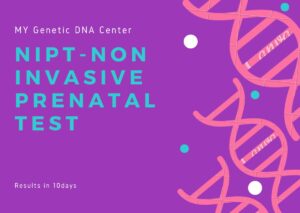Introduction to Karyotyping couple:
Karyotyping is a laboratory test that examines an individual’s chromosomes to detect any structural or numerical abnormalities. Chromosomes carry genetic material in the form of DNA, and a typical human has 46 chromosomes arranged in 23 pairs. In couples, karyotyping is often done to identify genetic causes of infertility, recurrent pregnancy loss, or certain inherited disorders.
The couple karyotyping test checks the genetic compatibility of partners. This text examines chromosomes for potential issues affecting fertility or increasing the risk of genetic problems in offspring. It’s recommended for couples facing recurrent miscarriages, fertility challenges, or a family history of genetic issues.
Why is Karyotyping Done for Couples?
Doctors may recommend karyotyping for couples when:
There is recurrent miscarriage (two or more consecutive losses).
A history of infertility is present without a clear cause.
A couple has a child with a congenital abnormality or developmental delay.
Either partner has a known family history of genetic disorders.
Pre-marital or pre-conception genetic screening is advised to assess risks.
How Does the Test Work?
Step-by-step process:
Sample Collection – A small amount of blood is drawn from each partner.
Cell Culture – White blood cells (lymphocytes) are cultured in the lab to stimulate cell division.
Chromosome Preparation – Cells are stopped at a stage where chromosomes are visible under a microscope.
Staining & Analysis – Chromosomes are stained, arranged in pairs, and examined for changes in number, size, shape, or structure.
Report Generation – The results are presented as a karyogram (chromosome map).
What Can Karyotyping Detect?
Numerical abnormalities – e.g., Down syndrome (Trisomy 21), Turner syndrome (45,X), Klinefelter syndrome (47,XXY).
Structural abnormalities – e.g., translocations, inversions, deletions, duplications.
Balanced chromosomal rearrangements – which may not cause symptoms in carriers but can affect offspring.
Benefits of Karyotyping for Couples:
Identifies underlying genetic causes of miscarriages or infertility.
Helps in family planning and risk assessment.
Allows for early decision-making in future pregnancies.
Guides assisted reproductive techniques like IVF with genetic screening.
Limitations of Karyotyping for Couples:
Cannot detect single-gene mutations (requires other genetic tests).
May not reveal very small chromosomal changes (microdeletions/microduplications).
Results can take 1–3 weeks depending on lab processing.
What makes couple karyotyping essential in evaluating fertility?
Couple karyotyping is essential in evaluating fertility because it provides critical insights into the genetic factors that may influence a couple’s ability to conceive and maintain a healthy pregnancy. By analyzing the chromosome structure of both partners, this test can identify hidden abnormalities, such as missing, extra, or rearranged chromosomal material, that might not be detectable through standard fertility tests.
These abnormalities can be responsible for recurrent miscarriages, failed implantation during IVF, unexplained infertility, or an increased risk of passing on genetic disorders to children. Detecting such issues early allows healthcare providers to design personalized treatment plans, recommend appropriate assisted reproductive technologies, or suggest genetic counseling to guide informed decision-making.
Ultimately, couple karyotyping not only helps pinpoint the underlying causes of fertility challenges but also increases the chances of achieving a successful and healthy pregnancy while minimizing genetic risks for the next generation.
Is karyotyping limited to couples experiencing reproductive difficulties?
No, karyotyping does not only apply to couples experiencing reproductive difficulties; it also benefits a wider range of individuals and situations. Doctors often recommend it for couples with recurrent miscarriages, unexplained infertility, or failed fertility treatments, as well as for those who have a family history of genetic disorders, congenital abnormalities, or developmental delays.
In some cases, couples planning a pregnancy may choose karyotyping as a proactive measure to assess potential genetic risks before conceiving. This test identifies chromosomal abnormalities that parents could pass on to their children, enabling early planning and informed reproductive decisions. Additionally, karyotyping can aid in diagnosing certain health conditions unrelated to fertility, such as unexplained physical or developmental traits, by revealing structural or numerical chromosome changes. Therefore, its scope extends beyond reproductive concerns, serving as a preventive and diagnostic tool for individuals or couples who want a clearer understanding of their genetic health.
The time frame for results typically ranges from one to three weeks, depending on the laboratory and the complexity of the analysis. The healthcare provider discusses the results with the couple to plan the next steps.
After collecting the blood samples, technicians culture and stimulate the white blood cells to divide, making the chromosomes visible for analysis. This process is meticulous and time-intensive, as specialists carefully examine the size, number, and structure of the chromosomes to identify any abnormalities. Some advanced laboratories may offer expedited testing, delivering results in a shorter time frame, but accuracy remains the priority. After completing the test, the healthcare provider reviews the report, explains the findings, and discusses possible next steps based on the results.
How to Get an Appointment?
To schedule an appointment,
Reach out to our clinic through phone, email, or online contact form. Our friendly staff will assist you in setting up an appointment.
During the consultation, you will have the opportunity to discuss your specific needs, ask questions, and gather information about whole exome sequencing. Our team will guide you through the process, explain the benefits, and address any concerns you may have.



